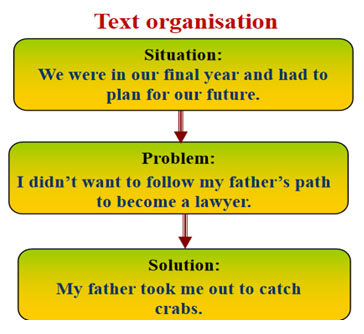Unit 1 Catching Crabs
 知识点一:Text Analysis: Catching Crabs
知识点一:Text Analysis: Catching Crabs
I. Warming up
(1) What is the article mainly about?
It's a story about a university student discussing his career ideas with his father and how his father encourages him to follow his passion.
(2) What sort of relationship do the father and son have?
The son seems afraid of being criticized for his ideas about a career and expects resistance from his father. However, the father actually supports what his son wants, but he makes him think about it by watching the crabs. So at the beginning we feel their relationship may not be good, but later it becomes clear that they have a good relationship and, in fact, their relationship has improved by catching crabs together.
II. Text analysis
1. Theme
What is the father trying to tell his son by showing the crabs? Do you think the father understand his son? How successfully do you think the "crab story" is ?
2. Style
a) Genre:
narrative essay
b) Diction:
Small, oral, more compound adjectives
c) Syntax:
Dialogue, short sentences
3. Structure

4. Detailed Analysis
(1) In the fall of our final year, our mood changed.
Why does the passage begin with a time expression?
The use of the time expression, together with the past tense, is a signal that this is a narrative with a sequence of events. The word our indicates that this is a story of personal experience.
(2) But there was something else.
What is the purpose of this short sentence?
This indicates that studying for the final exams was not the only concern of the students. So it is a transition from studying for final exams to the next topic – getting a job after graduation.
(3) I went home at Thanksgiving …
Why does the writer change from we to I?
Because this changes the focus onto the writer as an individual. The we paragraphs are general background to the main narrative about the individual, which is coming.
(4) Crabs fascinated me.
How does the focus change with this sentence?
The topic shifts to crabs. The sentence also arouses the readers' interest - we expect some fascinating new information about crabs here. Later, we realize how the topic of crabs is connected with the son finding a job, and the crabs' behaviour leads the father to give memorable advice.
(5)My father started the motor and we set off back home.
Is this an effective conclusion? Why / Why not?
Yes, we don' t know what happens next, but the implication is fairly clear that the father would support the son' s idea of travel and of being a writer. It makes a better conclusion not to say it explicitly, as it leaves a lot of room for personal interpretation.
Summary:
A technique which the writer uses to spark interest and to encourage a reader to read on is to change description, narration of events, and dialogue. In this passage, the change is often signalled by a narrative device - a sentence, a time expression, or direct speech - which comes at the beginning of the paragraph, and which prepares the reader for the rest of the paragraph. The only exception in this passage is the final sentence, where it's left to the reader to think about what happens next.
III. Reinforcement:
Discussion
(1) How important is it to be ambitious in life?
(2) Is being ambitious a positive part of personality?
(3) How much time should students spend planning their future?
(4) Is it part of a university' s role to help students choose a career?
